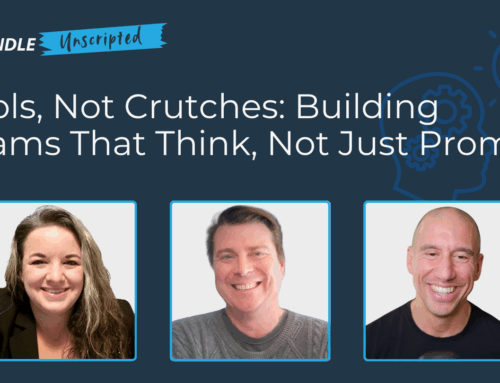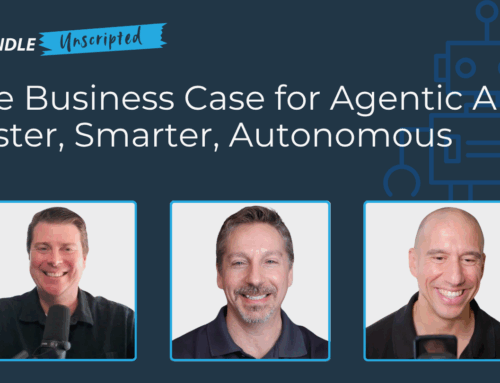“I need to file a patent!”
Sometimes that’s the first thing I hear from a client.
Before they even want to tell me about their app idea, they want to know about patents.
And I get where they’re coming from. But…
Starting your whole app building process worrying about patents is not a good strategy. In this article, I’ll be sharing some reasons why this is true – and what you might want to be pursuing instead.
Relying on Your Judgment Instead of the Market
There’s usually one simple reason why businesses get all gung-ho to file a software patent: they’re convinced their idea is good. In fact, they’re so convinced that they think their competition will try to steal it once they catch wind of it.
Sadly, many of these “great ideas” do not pan out. Why? Because they relied on guesswork and intuition rather than testing the market. Rather than putting out a demo, or creating an MVP (minimum viable product) version of the app, these companies lock in their plans on a hunch and jump straight into “protecting the idea” with expensive legal work. This legal work is costly in both time and money and does nothing to get the idea in front of potential customers.
Only afterwards do they find that customers didn’t really want it, wouldn’t pay for it, or found other solutions elsewhere. But by then, it’s too late. And you didn’t even need the patent, because no one’s going to steal an app idea that didn’t work.
Revealing Your Plans Too Soon – Giving Your Idea Away
Patents are public documents. To file one, you need to provide a lot of very specific details about your software. And once you’ve filed all that, any of your competitors can see it.
You might think it doesn’t matter, since they won’t be able to copy it. But what they can do, since you’ve shared all that lovely detail, is change it just enough to avoid a patent infringement lawsuit.
And let’s face it – if your starting point is filing a patent, there’s nothing stopping your competition from getting there quicker than you, assuming they have the resources to do so. Or they could do the market research you neglected and come to market with a similar – but better – solution.
Forecasting the Final Product
It’s hard to envision how your final product will really end up before you’ve even started. This is especially true if you’re completing your due diligence and incorporating user feedback into your plans as you go. In this way, good software development is like aiming at a moving target. You’re never quite sure exactly where it will end up, because you need to be flexible enough to follow your user and market needs.
When you file a patent, you’re locking in a final destination for what your software app is going to be. Unless you’re an oracle (or possess the world’s most accurate Magic 8-Ball) that’s rarely going to work out well for you.
Losing Flexibility for Your App in the Future
In the previous point, I discussed the challenge of predicting what your final software product will be. But let’s be honest… what is a “final product” when it comes to software, anyway? You might be updating and adding new features and functionality for years after your launch.
The more you change your software app, the less relevant your patent may become. And what happens if you want to adapt new technologies, or dramatically alter the UI, the database, or the outputs? You can’t enforce a patent if your own software no longer resembles what you originally filed.
You’ll either be stuck constantly updating and filing new patents and revisions, or risk your competition sneaking in and receiving a patent for that future state your app is evolving towards.
Either way, you lose an awful lot of flexibility that, in my experience, is critical to success in the mobile app market.
Are Software Patents Enforceable?
If my previous arguments didn’t sway you, this one might do the trick.
A fierce debate is raging in both the software and legal industries as to whether software patents are enforceable at all.
Most software is created using a variety of pre-built modules of code, and then customized with new code for specific interfaces, tasks and features. So what exactly are you patenting, if you didn’t build it all in the first place?
Not only that, but it’s also incredibly easy these days to make some minor tweaks and argue that a pre-existing patent doesn’t apply to the “newer” software.
The U.S. courts have been stuck in this quagmire for years, and seem to be moving towards finding software patents unenforceable. A recent article from techdirt, Prominent Pro-Patent Judge Issues Opinion Declaring All Software Patents Bad, suggests this might even be the killing blow.
Along those same lines, the World Intellectual Property Organization (WIPO) recommends you think twice before filing a software patent, and at least consult an intellectual property expert before you do. Differences in how software and patents are perceived vary from country to country, and trying to enforce them in an international economy is even more challenging than trying to get a straight answer here in the U.S.
Maybe I Don’t Want a Software Patent … What Should I Do Instead?
Hopefully, I’ve shown you that worrying about patents is not the best way to start the journey of your software app. So what should you be doing instead?
Flesh out your idea. Test the market. Listen to your customers. Respond to feedback. Build a demo … or better yet, an actual MVP. Always focus on what’s most important at every step.
This kind of flexibility is one of the main advantages of Agile software development. If you hope to be successful with mobile apps, you’ll need to adopt Agile methods. Locking in everything you think you’re going to do up front is the opposite of Agile … and will make it very hard to succeed.
If you’re still concerned about protecting your idea, that’s understandable. I get it. And I’ll share some ways to protect yourself in an upcoming post. So stay tuned… or give Ascendle a call, ask for your free consult, and we can address those concerns directly.
So when I advise you not to start your app building process with a patent, you’ll understand why I say that. After all, you have much better, far more important things to do!






